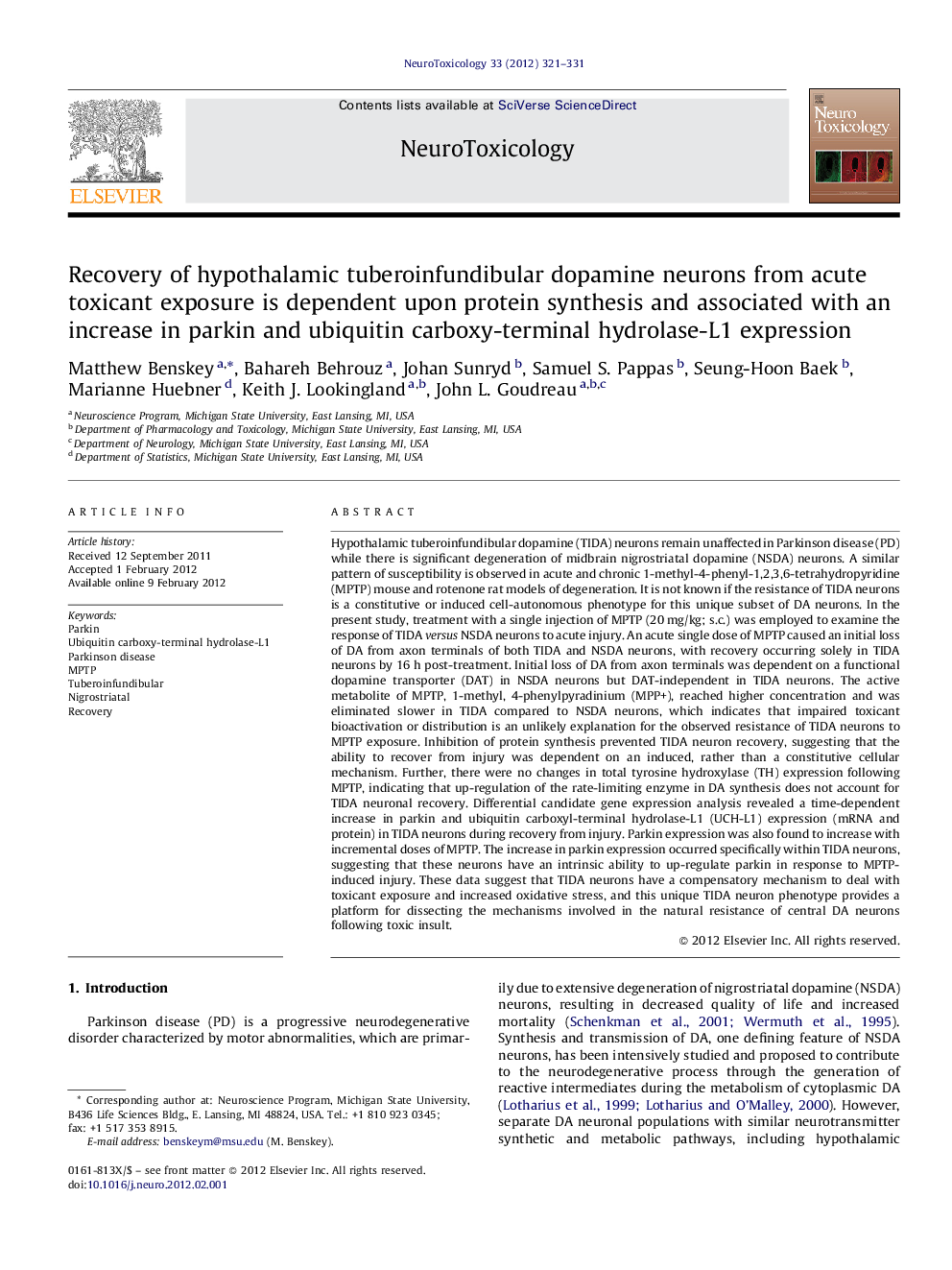| کد مقاله | کد نشریه | سال انتشار | مقاله انگلیسی | نسخه تمام متن |
|---|---|---|---|---|
| 5855310 | 1131731 | 2012 | 11 صفحه PDF | دانلود رایگان |

Hypothalamic tuberoinfundibular dopamine (TIDA) neurons remain unaffected in Parkinson disease (PD) while there is significant degeneration of midbrain nigrostriatal dopamine (NSDA) neurons. A similar pattern of susceptibility is observed in acute and chronic 1-methyl-4-phenyl-1,2,3,6-tetrahydropyridine (MPTP) mouse and rotenone rat models of degeneration. It is not known if the resistance of TIDA neurons is a constitutive or induced cell-autonomous phenotype for this unique subset of DA neurons. In the present study, treatment with a single injection of MPTP (20Â mg/kg; s.c.) was employed to examine the response of TIDA versus NSDA neurons to acute injury. An acute single dose of MPTP caused an initial loss of DA from axon terminals of both TIDA and NSDA neurons, with recovery occurring solely in TIDA neurons by 16Â h post-treatment. Initial loss of DA from axon terminals was dependent on a functional dopamine transporter (DAT) in NSDA neurons but DAT-independent in TIDA neurons. The active metabolite of MPTP, 1-methyl, 4-phenylpyradinium (MPP+), reached higher concentration and was eliminated slower in TIDA compared to NSDA neurons, which indicates that impaired toxicant bioactivation or distribution is an unlikely explanation for the observed resistance of TIDA neurons to MPTP exposure. Inhibition of protein synthesis prevented TIDA neuron recovery, suggesting that the ability to recover from injury was dependent on an induced, rather than a constitutive cellular mechanism. Further, there were no changes in total tyrosine hydroxylase (TH) expression following MPTP, indicating that up-regulation of the rate-limiting enzyme in DA synthesis does not account for TIDA neuronal recovery. Differential candidate gene expression analysis revealed a time-dependent increase in parkin and ubiquitin carboxyl-terminal hydrolase-L1 (UCH-L1) expression (mRNA and protein) in TIDA neurons during recovery from injury. Parkin expression was also found to increase with incremental doses of MPTP. The increase in parkin expression occurred specifically within TIDA neurons, suggesting that these neurons have an intrinsic ability to up-regulate parkin in response to MPTP-induced injury. These data suggest that TIDA neurons have a compensatory mechanism to deal with toxicant exposure and increased oxidative stress, and this unique TIDA neuron phenotype provides a platform for dissecting the mechanisms involved in the natural resistance of central DA neurons following toxic insult.
⺠Recovery of hypothalamic DA neurons from acute MPTP is protein synthesis dependent. ⺠Parkin expression increases in hypothalamic DA neurons following acute MPTP. ⺠UCH-L1 expression increases in hypothalamic DA neurons following acute MPTP. ⺠DA neuronal response to MPTP is not due to region differences in MPP+ pharmacokinetics.
Journal: NeuroToxicology - Volume 33, Issue 3, June 2012, Pages 321-331